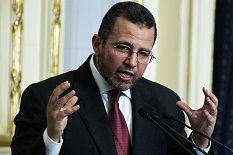
By Ammar Abdulhamid, Now News
If the purpose of the looming US-intervention in Syria is to restore America’s credibility, and more specifically President Obama’s, which has suffered measurably on the international scene as a result of his foot-dragging over the last two and a half years, then a limited intervention will prove insufficient and will surely backfire.
For should the anticipated intervention fail to cripple the offensive capabilities of the Assad regime, a return to the status quo ante of strife and bloodshed will take place within days, not weeks. The world will be watching for such a development. Consequently, rather than restore President Obama’s credibility, the strikes will further undermine it. This development will also strengthen the position of the extremist camps within both opposition and loyalist forces, as both sides will be able to use such a soft strike as an indication of the lack of seriousness on part of the international community, particularly the US, in regards to managing the Syrian conflict. Escalations will follow, and the impact of the strikes will be forgotten.
The Syria intervention needed, both to restore America’s credibility and help ease the suffering of the Syrian people, should go beyond the limited objective stated by White House officials, including President Obama himself. It should not only focus on punishing Assad for using chemical weapons, but should seek to bring him to justice and stand trial for his crimes. It’s about time his impunity was punished, and this tragicomedy of errors and mayhem brought to an end.
Indeed, the conflict in Syria may not end with Assad’s ouster, and the ensuing transitional period might still be violent. Yet, to give the perpetrator of the bloodiest crackdown the world has witnessed in decades another chance to cling to power or to chart a graceful exit for himself and his partners in crime will make a mockery out of any conception of justice. You don’t punish a mass murderer with a slap on the wrist. The punishment must fit the crime.
Whether he likes it or not, President Obama’s historic legacy will likely be judged, at least on the international level, specifically by what happens in Syria. By addressing a conflict that has killed at least 100,000 people and dislocated millions more from the narrow angle of chemical weapons, responsible for the deaths of only few hundred so far (though these figures are debatable), President Obama appears unperturbed and unconcerned with the human toll involved. Worse, he seems to be unwittingly legitimating killing perpetrated by more “traditional” means.
President Obama might still have a problem admitting it, even to himself, but in reality, the current mayhem in Syria is in part his fault. For it is his failure to intervene in the crisis when good and bad guys were easily distinguishable and when “a shot across the bow” could have prevented this descent into sectarian mayhem that has paved the way to this point at which waters are murky and choices hard.
But choices still have to be made, and the crisis must be brought to an end before it metastasizes beyond all control. A regional meltdown will not come as a result of a serious American strike against Assad, but as a result of further inaction.
Indeed, it is much more than America’s credibility that is at stake here; it’s the viability of the existing world order, something that remains a project more than a reality at this stage and could therefore be derailed at any given moment. That moment might be looming.
The days ahead will decide once and for all what kind of president Obama really is, and what his foreign affairs historical legacy will be. If Obama’s latest act of dithering, allowing for the current showdown on the Hill, is any indication in this regard, then things do not augur well. The move might have certain domestic “calculus” behind it, but on the international level, it only served to make him appear weak and indecisive, in a world where perceptions matter more than reality.
Should the Congress refrain from backing the President, or should it impose even more stringent limitations on the mission’s scope, the results will be disastrous, for Syria, for the region, and for global security. For what happens in Syria will not stay in Syria, and spillovers will not be limited to the region. Now more than ever, every local crisis will have global implications. Isolationism has no place in the modern world. For the same reasons America cannot disengage commercially from the world, she cannot disengage militarily from it. Until the UN becomes a more efficient institution when it comes to conflict arbitration, it will be up to the US to continue to play the role of enforcer of global law and order, an admittedly thankless but necessary task. For a variety of reasons, elected officials in the US may choose to avoid making this particular argument clear to the American people, but they are well-advised not to lose sight of it in their internal debates. The US cannot afford to cede global leadership when the world is confronted with crises like the one currently unfolding in Syria. We have already seen what inaction can do. Now, it’s time to act, and act decisively.
Ammar Abdulhamid is a Syrian dissident and the president of the Tharwa Foundation. He currently divides his time between Washington, D.C. and Turkey where he works with local Syrian activists on developing long-term peace-building and democracy-promotion programs.
This article was originally published on Now News.



